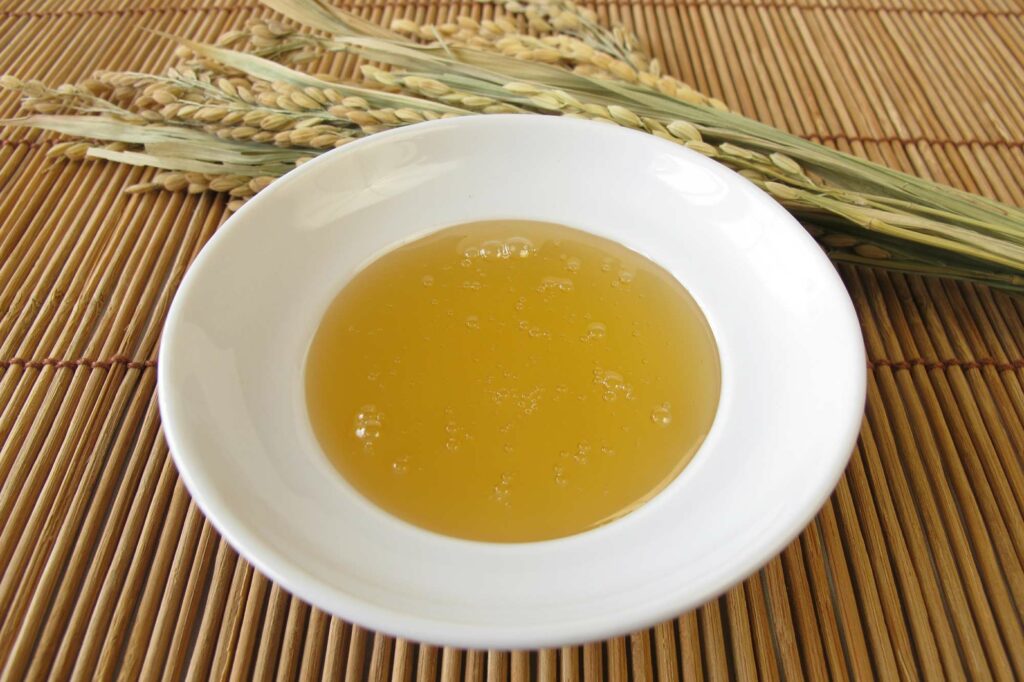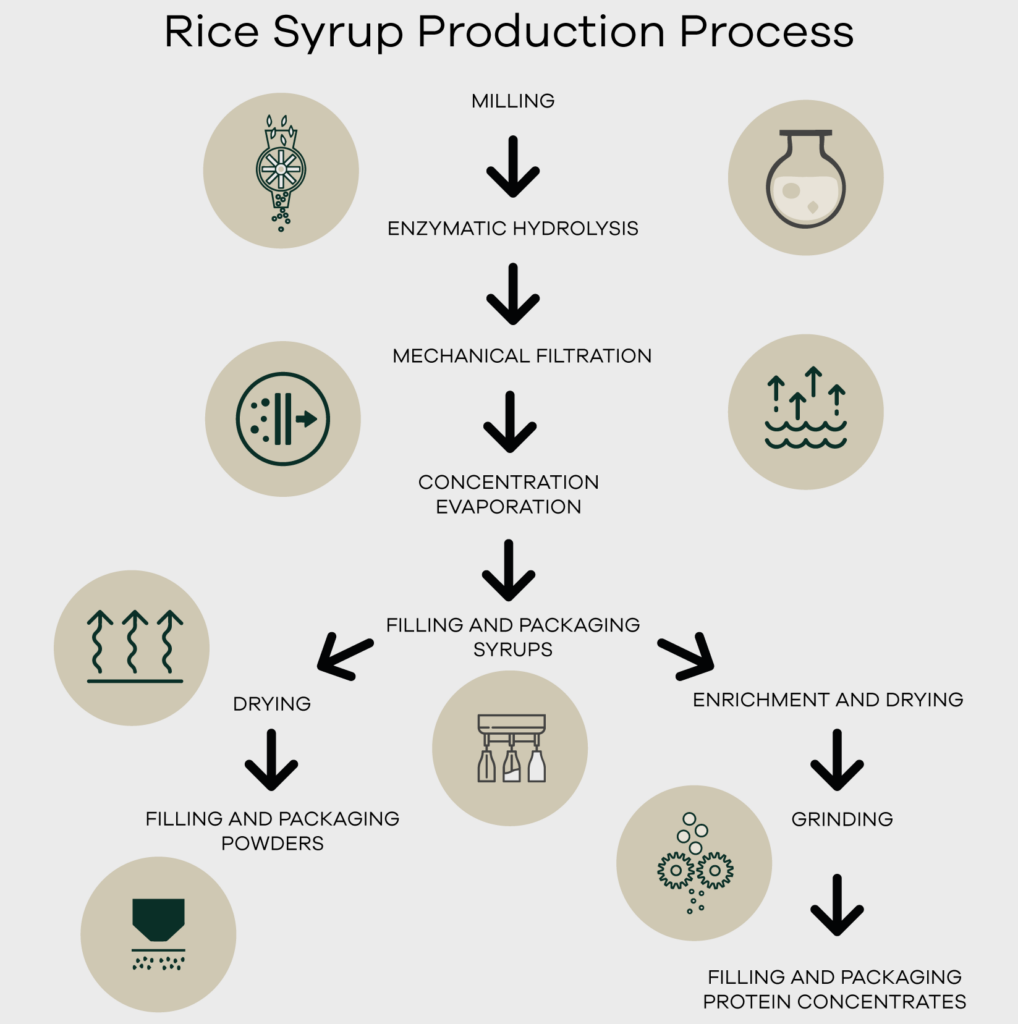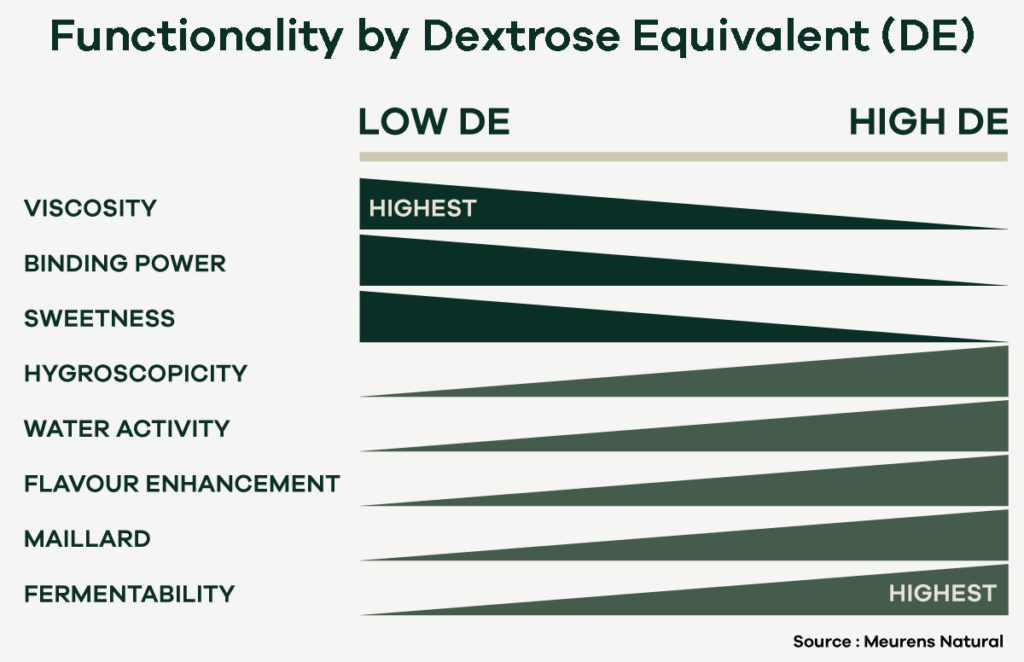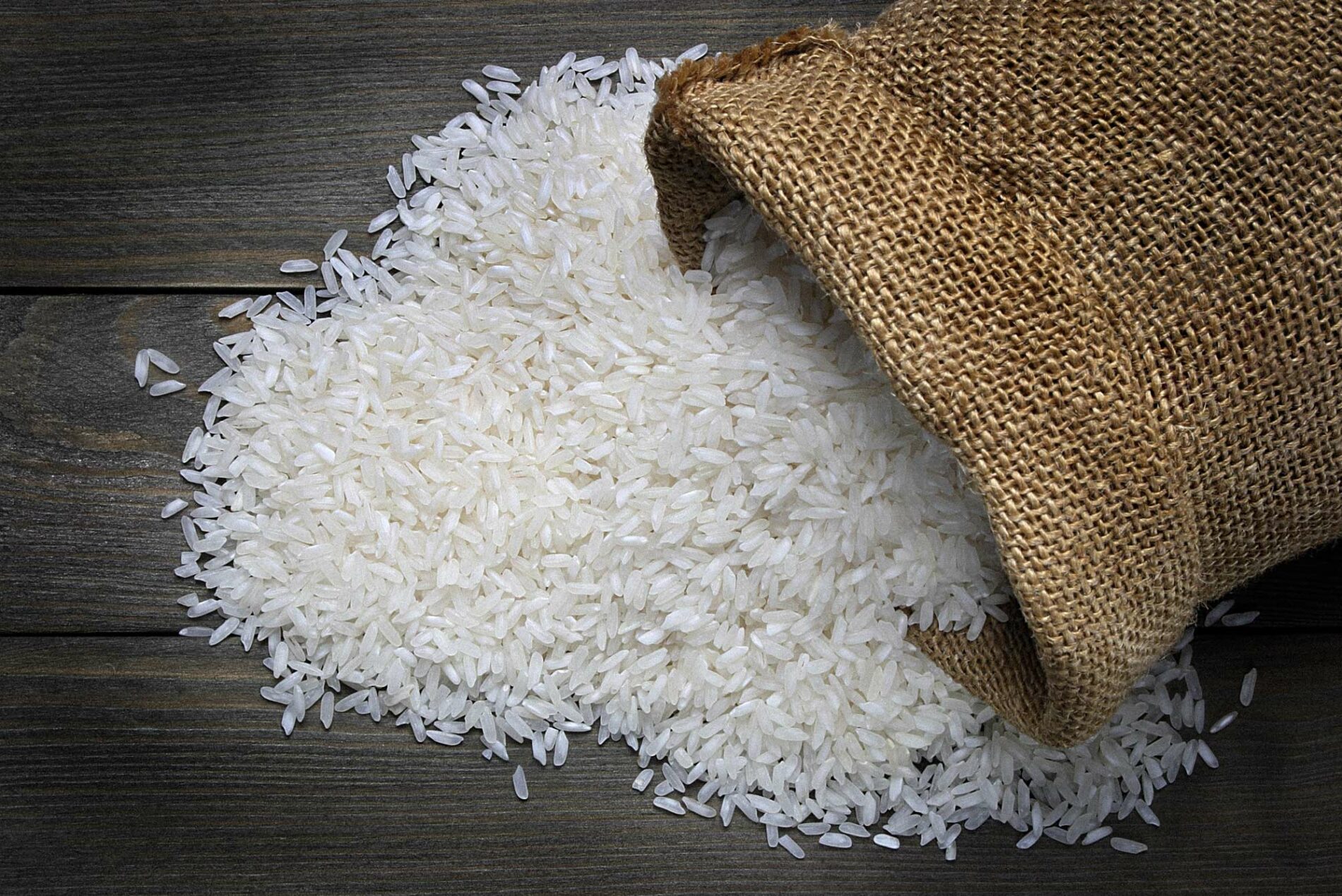Rice syrup is a sweetener that is rapidly gaining popularity as a more natural alternative to refined sugar, and this makes it an attractive option for food manufacturers especially those in pursuit of a clean label formulation.
Utilising cooked rice or rice flour that has undergone a natural process of enzymatic hydrolysis to break down the starches into simple sugars, it is possible to produce several end-products that are uncomplicated in their processing cycle, and that are each highly adaptable. Rice Syrup is one of those outputs, and has proven to be far more versatile than other sweeteners.
Consequently, Rice Syrup is well suited to the increasingly demanding NPD cycles more commonly found with the food producers of today all vying to win consumer hearts with clean labelled, healthy and exciting food innovations.
What is Rice Syrup?
Honey-brown in colour with a cereal taste, rice syrup is a highly functional and versatile sweetener that offers a mild, slightly nutty flavour and a thick, viscose consistency, making it ideal for a wide range of culinary applications. It’s therefore used not only as a sweetener but also as a binding or bulking agent.
The processing cycle that is undertaken to produce Rice Syrup does not include any chemical refinement or processing. It’s a natural process allowing the mineral content of the raw material, rice, to be largely retained and this makes it a valuable ingredient for manufacturers looking to create healthier products.

Whereas in the case where foods are chemically treated and processed to create a syrup or powder such as acid hydrolyzed Glucose Syrup, the natural minerals are either stripped or destroyed. Naturally occurring minerals such as Calcium, Iron, Magnesium and Potassium are present in raw, untreated rice and are important for healthy bodily function. It therefore stands to reason that Rice Syrup, if able to retain these minerals, is a healthier option.
Minerals found in raw rice
| Calcium ( Ca) | Iron(Fe) |
| Magnesium (Mg) | Phosphorous (P) |
| Potasium (K), | Sodium (Na) |
| Zinc (Zn) | Copper (Cu) |
| Manganes (Mn) | Selenium (Se) |
Moreover, from a manufacturing perspective Rice Syrup satisfies a number of key challenges posed when trying to produce products at scale in an efficient manner, helping to not only optimise the cost of raw materials but also where labeling, perception and positioning are concerned in respect to consumer sentiment, and critically government legislation not least with HFSS.
Three key benefits for Rice Syrup stand out:
- The use of Rice Syrup makes for a shorter ingredient list. By incorporating variants of Rice Syrup, with each fulfilling its own functionality, they can all be included in the same product but listed as one single ingredient.
- Clean & clear labeling becomes easier. The typical consumer finds it easier to understand ingredients such as “Rice Extract” or “Rice Syrup” as opposed to “Glucose Syrup”, or “Inverted Sugar”.
- If you use Rice Syrup as a concentrate to produce either a plant-based drink, yoghurt, dessert or ice cream and so on, manufacturers can label it as a single ingredient with a percentage value, “Rice %”.
In this article, we’ll explore the benefits of using Rice Syrup in food production, its application, and how it can be incorporated into your products to appeal to health-conscious consumers. We’ll start with how it’s made.
How Rice Syrup is Made
Compared to other sweeteners such as corn syrup or refined sugar, the process of making Rice Syrup is more natural and far less processed, and therefore has far reaching qualities where health and sustainability are concerned.
The broad concept involves the use of non-GMO enzymes to break down the starches in rice via a natural process called hydrolysis.

Pre-processing
As a natural ingredient, any type of rice is suitable for hydrolysis; white, brown or broken rice are all usable. However the Rice Syrup that we supply via Meurens Natural, is purely derived from white rice. Depending upon the type of rice being used as the base input, and how by-products are implemented and refined, the finished product can vary significantly by way of quality, sweetness, texture and format.
Enzymatic Hydrolysis
The primary activity to produce Rice Syrup is a natural hydrolysis process that utilises cooked rice or rice flour and natural enzymes to break down the starches into simple sugars. This process is called enzymatic hydrolosis, and begins by cooking rice in water to create a rice slurry. The slurry is then cooled and a non-GMO enzyme is added.
The rice and enzyme slurry mix is then left for sufficient enough time to allow the enzymes to work their magic and break down the starches to the desired level.
Boiling and Filtration, Concentration and Evaporation
After the hydrolysis process is complete, the liquid is separated from the solid rice grains and filtered to remove any impurities. The resulting liquid is then boiled and concentrated to create a thick syrupy consistency that is perfect for use as a sweetener in a variety of culinary applications.
This paves the way for further evaporation and drying to concentrate the product into different strains of Rice Syrup and Rice Syrup Powder, that are then ready for packaging.
Additionally, it is possible to upcycle the leftover rice protein by-product from the Rice Syrup production meaning three products are created in all : Rice Syrup, Rice Syrup Powder and Rice Protein.
Chemical Makeup of Rice Syrup
The chemical makeup of Rice Syrup varies depending on the degree of hydrolysis and processing, but generally consists of a mixture of glucose, maltose, and maltodextrin . The individual components will vary depending on the functionality required, but will be finely controlled to meet the desired level on the sugar spectrum. The formula for rice syrup is C6H12O6 for glucose, and C12H22O11. for maltose and C6nH(10n+2)O(5n+1) for maltodextrin.
Syrup Mineral Content (PPM)
| Potassium | 840 |
| Iron | 1 |
| Calcium | 50 |
| Magnesium | 300 |
| Phosphorus | 800 |
Powder Mineral Content (PPM)
| Potassium | 1440 |
| Iron | 1 |
| Calcium | 60 |
| Magnesium | 360 |
| Phosphorus | 960 |
Benefits of Rice Syrup for both Manufacturer and Consumer
We agree Rice Syrup is a popular choice for health-conscious consumers. As a result of the natural enzymatic processing, and the limited need for refinement to achieve and produce a usable product, Rice Syrup is a popular choice among food manufacturers especially those looking for clean label options.
However it’s important to understand why, and to not get caught up in the wrong argument. For example, it’s all too easy to be convinced by broad sweeping claims of super food status increasingly being found online. One of these claims cite Rice Syrup as being ‘low GI’ and therefore ‘suitable for diabetics’. Of course, Rice Syrup can be consumed by diabetics but to claim it is suitable would suggest there are benefits to be had through consumption, which is simply not true. Rice Syrup is as much of a sweetener as any other sugar, and recommending to a diabetic seeking to manage their sugar intake that Rice Syrup is a better choice for them over other lower GI sweeteners could well lead to further problems. Rice Syrup is just as impactful to blood sugar and spiking as with any other high GI food and this must not be ignored. One can of course blunt the GI response of Rice Syrup (or any other glucose-based sweetener for that matter) by increasing the amount of fibre or fat within a serving. However, if you are diabetic and are seeking a dietary recommendation for how to sweeten your food then our best advice would be to consult with your Doctor to plan a diet that is unique to you and not that of somebody else before making any changes.
That being said, Rice Syrup does have some key benefits to consumers that makes it far more suitable for clean labelling, but we must be clear as to the how and why.
Firstly, health-conscious consumers are often seeking out products that have not been through chemical processing or excessive refinement. The production process of Rice Syrup is completely natural; the journey from start to finish is achieved without use of chemicals, largely achieved through a single process of enzymatic hydrolysis. This makes Rice Syrup an important alternative to other sweeteners most often used in food production.

Secondly, Rice Syrup is something that can more easily be understood by consumers. In their efforts to scour the shelves to seek out clean labelled goods, products containing rice syrup will stand out. Some other sweeteners such as Glucose Syrup are less widely understood and people often misinterpret them. They perhaps don’t quite know what Glucose is, or where it came from and so when reading ingredients list and seeing things like Glucose, Fructose and Sucrose all on the same label, the complexity can be overwhelming.
Rice Syrup has very little to be confused about and so even the time-short shopper casting their eye down the ingredients list will be able to more easily and quickly understand both what Rice Syrup is.
Dextrose Equivalent
It’s worth pointing out that depending on the level of hydrolysis and processing, it’s possible to create many different variants of Rice Syrup. Dextrose equivalent (DE) is a measure of the amount of reducing sugars present in a sugar product, expressed as a percentage on a dry basis relative to dextrose. The dextrose equivalent gives an indication of the average degree of polymerisation (DP) for starch sugars.

To be clear:
- Rice Syrup that has Low DE is viscose and less sweet, so is used as a binding ingredient.
- Rice Syrup that has High DE is more sweet and so is used to modulate flavour.
By using one or the other a completely different impact is achieved – by using both or a combination of, it becomes possible to satisfy more than one objective with only one ingredient reference.
For example, cereal bars requiring a chewy, more viscous texture can benefit from a Low DE Rice Syrup, whilst also containing High DE Rice Syrup to manage sweetness and flavour profile, and all with one single ingredient on the label.
Culinary Uses of Rice Syrup
Rice Syrup is an incredibly versatile ingredient that can be used in a variety of product applications. From baking to sauces and cereals.
Some of the most common uses of Rice Syrup include:
- Sweetener for baked goods: Rice syrup can be used as a natural sweetener in a variety of baked goods, such as cookies, crackers, biscuits, cakes and muffins. It provides a mild sweetness and a moist texture that is perfect for baked goods.
- Beverages: Rice syrup can be used to sweeten homemade and packaged beverages such as tea, coffee, and smoothies. It can also be used as a base for making syrups and flavourings.
- Alcoholic Beverages: Rice Syrup is a popular ingredient in the production of several types of alcoholic beverage, from wine, to cocktails and also beer, particularly gluten-free beer.
- Confectionery: Rice syrup can be used as a binding agent in confectionery products such as candy and chocolate. It can also be used as a sweetener in caramel and toffee.
- Nutritional confectionary: Rice syrup is a common ingredient in energy bars due to its high carbohydrate content.
- Sauces and dressings: Rice syrup can be used as a natural sweetener in sauces and dressings, providing a mild sweetness and a smooth texture.
- Cereal bars: Rice Syrup provides a natural and healthy alternative to refined sugar and other artificial sweeteners, making it suitable for cereal bars without overbulking on sugar content.
- Breakfast cereals: In much the same way as with other food applications, Rice Syrup can be used in breakfast cereals to contribute to both texture and taste.
- Plant-based alternatives: Vegan Ice Cream, yogurt, drinks, desserts can all benefit from Rice Syrup to aid both texture and taste.
Consequently, and with so many different products applications, Rice Syrup is in high demand as both a sweetener to existing recipe reformulations but emerging as a key component and vegan-friendly ingredient for the increased demand in plant-based alternatives.
Did you know?
As the 9th largest global producer of rice, in 2022 Japan produced and milled 7.45 metric tons. Rice has been a staple food of the Japanese for 10,000 or more years and so it’s of little surprise that Rice Syrup is now used so extensively in Japan, and not least in the production of various types of Rice Wine.
You may have prepared Japanese food with Mirin, a sweet rice wine that is commonly used in sauces, marinades and dressings. You might then wash down your meal with a glass or two of hot Sake, which is a traditional Japanese dry rice wine.
In both cases, the Rice Syrup is mixed with a mold derived enzyme called Koji, and depending on the recipe will be left for weeks (Sake) or months (Mirin) to ferment. The resulting liquid is then filtered to produce a clear liquid. Both Mirin and Sake are produced at around 15% – 16% ABV.
Sourcing Rice Products
It is important to prioritise the quality and safety of the rice used in the production of rice products such as Rice Syrup and Rice Syrup Powder, as contaminated rice can have negative health implications. Choosing rice or rice products from microbiologically controlled grains can help mitigate this risk, as can opting for products that are free from genetic engineering.
We source only the very best quality Rice Syrups, from Meurens Natural. There are a few key things to be aware of when sourcing Rice Syrup products, and this is where Meurens have surpassed expectation in all areas.
- Quality of the rice: Ensure that the rice used to make the syrup is of high quality and free from contaminants such as arsenic. If you are producing organic products then you must seek out organic certification. Meurens supply both conventional and organic rice syrup products that are free of contaminants.
- Manufacturing process: Look for products that are made using a clean and safe manufacturing process, without the use of harmful chemicals. Again, Meurens go through a natural production process with no chemical additives or chemical processes (absent of refining).
- Purity of the product: Check the label to make sure the product is pure and does not contain any additives or fillers. Rice Syrup from Meurens never contains added ingredients (such as Fructose) and will always be 100% natural Rice Syrup!
- Food Safety and Religious objectives: If producing products for Islamic or Jewish customers Meurens can supply both Halal and Kosher syrups, and with FSSC 22000 accreditation with a strict avoidance of GMO derived rice material.
- Product functionality and sweetness: Rice Syrup products vary significantly by way of functionality and sweetness depending on how it has been refined and processed. Meurens are able to supply in both Syrup or Powder formats and at varying dextrose equivalent’s (DE) (35DE or 62DE in syrups, 18DE or 32DE in powders).
- Supplier reputation: Choose a supplier with a good reputation for quality and reliability, and traceability. Do your research and read reviews or ask for recommendations. Needless to say, the reliability and consistency of products sourced via Meurens are without doubt some of the best. Manufactured in Europe (Belgium), the supply chain is shorter to the UK, traceable and controlled.
With these factors in mind, you can ensure that you are sourcing high-quality Rice Syrup products for your manufacturing needs.
Rice Syrup summary
Rice Syrup as a natural sweetener can be used in a variety of product applications, including baked goods, beverages, confectionery, sauces, dressings, and energy bars. It is made by the enzymatic hydrolysis of rice to break down starches into simple sugars, resulting in a sweet syrup that is less exposed to processing, easier to understand by the consumer, and higher in nutrients compared to other sweeteners.
- By using Rice Syrup in food production, food manufacturers can offer a more natural alternative to their customers, while also improving the flavour and texture of their products.
- Derived from Rice, consumers understand it and manufacturers can incorporate easily into reformulation without the need for complexity. It’s possible to use both products with high DE and low DE listing only one ingredient back of pack.
- With its versatility and nutritional benefits, Rice Syrup is a great choice for anyone looking to reduce their consumption of refined sugars and artificial sweeteners.
We encourage readers to consider incorporating Rice Syrup into their product formulations and to explore the many benefits it has to offer. By doing so, they can create healthier and more delicious products that meet the needs and preferences of today’s consumers.
Lehmann Ingredients supply both liquid Rice Syrup, and dehydrated Rice Syrup powder.
How can we help?
Lehmann Ingredients have a 35 year history in the sourcing and supply of food ingredients for customers both in and outside of the UK. We are trusted suppliers of high-quality Rice Syrup products to a number of high-profile organisations from vegan startups innovating with clean label alternatives, to more established food companies leading in various retail categories such as sports nutrition and cereals.
We source all of our Rice Syrup from Meurens Natural. Meurens manufacture in Europe (Belgium) and their focus upon quality fits perfectly with our own objectives to ensure that we meet strict targets in quality, volume and price. So whether you have a specific challenge to reformulation, or a custom idea for NPD be that specific Brix, specific DE, specific origin, specific rice breed and so on, then do reach out.
Contact a member of our team by emailing enquiries@lehmanningredients.co.uk or calling +44 (0) 1524 581560.




